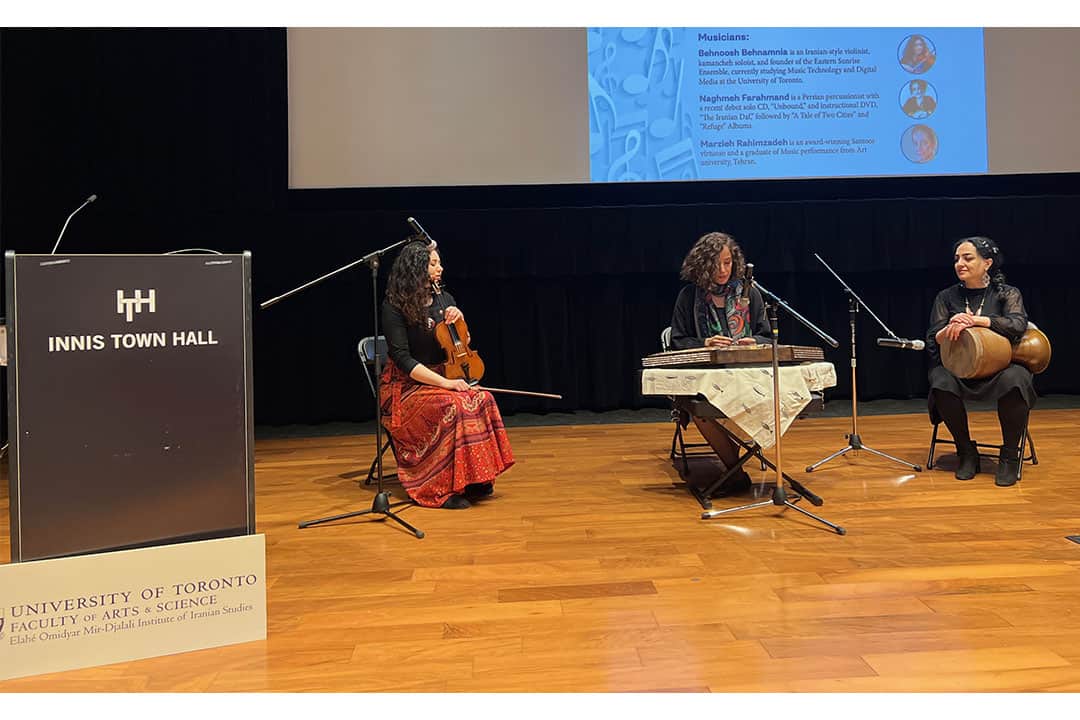The Elahé Omidyar Mir-Djalali (EOM) Institute of Iranian Studies focuses on providing scholars and students across fields the opportunity to engage with Iranian history and culture. Established in 2020 through a $6 million USD donation from the Roshan Cultural Heritage Institute — a private foundation based in the United States aiming to preserve and spread awareness of Iranian culture and history — the EOM Institute runs events, provides fellowships and hosts Iranian scholars from across Canada.
Yasamin Jameh is a fourth-year student majoring in international relations and peace, conflict, and justice studies and minoring in Near & Middle Eastern civilizations. Since 2022, she has been a work-study student at the EOM Institute, where she produces its official podcast Parse: An Exploration of Critical Topics in Iranian Studies.
The Varsity spoke with Jameh about the activities and programs the EOM Institute offers and how her work connects to her Iranian identity.
The Varsity: What do you think is particularly unique about the Elahé Omidyar Mir-Djalali Institute’s work?
Yasamin Jameh: The EOM Institute is very unique because, although we’re a recent institute, we are hiring over 60 work-study students, so there are plenty of opportunities to get involved for the student body. It’s very unprecedented that we’re able to have enough financial and institutional support to manage a group of work-study students and researchers this large.
The institute is also really a hub for the digital humanities. We have all these cool projects going on in collaboration with Encyclopædia Iranica — an international not-for-profit archival project — along with our own projects. This is real work being done to pave new avenues and new approaches to Iranian Studies rather than the traditional things that have been already researched for decades.
When you are involved with the institute and with organizing these events, there is definitely a sense of community. As a person of Iranian descent, it was hard, especially with U of T being such a big campus and there not being as many Iranian students on this campus. The institute has served as a place for me to meet other Iranian students and form friendships with them through social events, events for Norouz — the Iranian New Year — other holiday events, and all the events that we hold both online and in person. It’s definitely a place to form lifelong friendships and networks.
TV: Over the past decades, there has been an increase in Iranians immigrating to Canada. How does the EOM Institute provide a space for the Iranian diaspora in Toronto to explore their roots?
YJ: Toronto has one of the biggest communities of diasporic Iranians. As a second-generation Iranian, I can definitely relate to the desire to learn more about your roots, whether it is through celebrating Iranian holidays or learning about your history, the Persian language, and cultural practices. When you’re away from your homeland and you’re sort of homesick, there’s definitely an urge to learn more and connect with it somehow.
The EOM Institute is the first of its kind in Canada. It’s the first Iranian studies institute anywhere in Canada, and definitely the first one in Toronto. This is a great safe space for Iranians and non-Iranians to explore Iranian culture and not just the Iranian culture and history of Iran proper, but also the greater world surrounding Iran — the broader Middle East, Central Asia, and the Caucasus. It’s definitely a great place to start to connect with your roots.
TV: How can students who are interested in researching Iranian studies get involved with the EOM Institute?
YJ: One of the best ways that you can get involved is by attending our events. The second way is through our work-study positions, which are paid [part-time] positions for U of T students.
The EOM Institute has a multi-year collaboration with Encyclopædia Iranica to compile information and resources for two distinct projects. One of them is Cinema Iranica, which seeks to compile everything related to Iranian cinema history under one umbrella.
The other one is the Women Poets Iranica project. Persian poetry is famous, it’s one of the most ancient and rich poetic cultures in the world. However, throughout its existence, the works of men have been most talked about in academia and the literary sector. So the Women Poets Iranica project seeks to put women at the forefront and center their works.
This interview has been edited for length and clarity.



No comments to display.